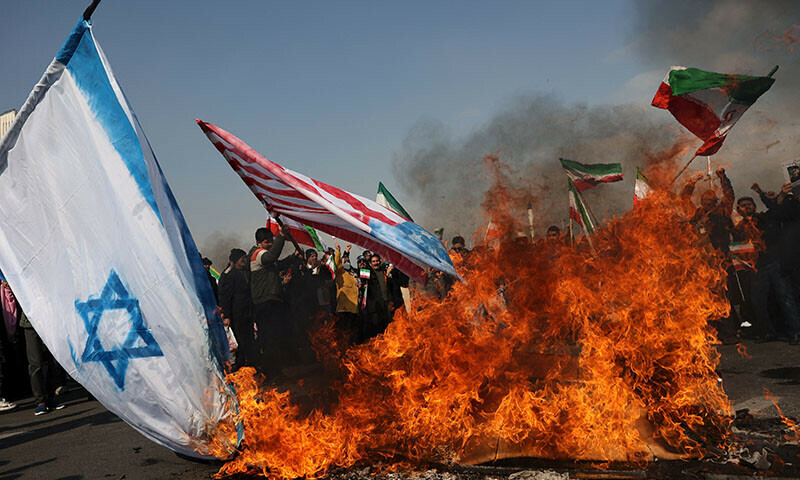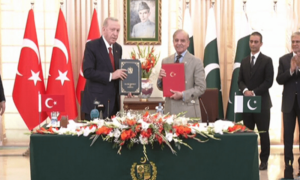Israel is likely to attempt a preemptive strike on Iran’s nuclear programme in the coming months to set its progress back but escalate tensions across the Middle East and renew fears of a wider regional conflagration, a US intelligence report says.
Warnings about a potential Israeli strike were included in multiple intelligence reports between the end of the Biden administration and the start of the Trump administration, none more comprehensive than an early January report produced by the Joint Chiefs of Staff’s intelligence directorate and the Defense Intelligence Agency (DIA).
The report warned that Israel is likely to attempt a strike on Iran’s Fordow and Natanz nuclear facilities within the first six months of 2025.
Serving and former US officials told The Washington Post that the prediction is rooted in an analysis of Israel’s planning following its bombing of Iran last October, which degraded Tehran’s air defences and left it exposed to further attacks.
The officials spoke anonymously to discuss highly classified intelligence. The Israeli government, CIA, DIA and Office of the Director of National Intelligence declined to comment.
Brian Hughes, a spokesman for the White House National Security Council, said that US President Donald Trump “has made it clear: He will not permit Iran to get a nuclear weapon.
“While he prefers negotiating a resolution to America’s long-standing issues with the Iranian regime peacefully, he will not wait indefinitely if Iran isn’t willing to deal, and soon,” Hughes told The Post.
Hughes declined to comment on the underlying intelligence.
The prospect of an Israeli strike poses an early test for Trump, who campaigned on restoring peace in the Middle East and Europe while also touting staunch support for Israel.
The military intelligence report highlighted two potential strike options, each involving the United States providing support including aerial refuelling, intelligence, surveillance and reconnaissance, said those familiar with the document.
Reliance on the US in any strike on Iran underscores Washington’s leverage over Israel’s path forward.
According to the intelligence report, a distance attack, known as a stand-off strike, would see Israeli aircraft firing air-launched ballistic missiles (ALBMs) outside of Iranian airspace.
A stand-in strike by contrast would see Israeli jets enter Iranian airspace, flying near the nuclear sites and dropping BLU-109 “bunker buster” munitions. The Trump administration approved the sale of guidance kits for these weapons last week, notifying Congress that it had done so.
The US assessment found that an Israeli attack on Iranian nuclear facilities would set back Tehran’s activities by weeks or months, current and former officials said. Any attack also would incentivise Iran to pursue enriching weapons-grade uranium, they added.
The six-month time frame for a potential operation and details on the two strike options were not previously reported. The Wall Street Journal reported on Wednesday that Israel is considering a strike on Iran this year.
Some Israeli officials disagree with the US intelligence assessments on the potential impact of a strike on Iran’s facilities, arguing that it could more substantially set back Tehran’s capabilities. “That was a difference between our intelligence and their assessment,” said a former US official.
The revelation coincides with a robust debate within the Trump administration about the proper application of military power in the Middle East.
Trump has surrounded himself with an ideologically diverse national security team, including foreign policy hawks national security adviser Michael Waltz and Secretary of State Marco Rubio, advocates of military restraint Vice President JD Vance and Director of National Intelligence Tulsi Gabbard and “prioritisers” such as Elbridge Colby, who seek to reorient US military resources to East Asia to counter China.
In January, Waltz raised the prospect of a US-supported Israeli strike on Iran’s nuclear programme, telling CBS News, “This is a moment to make those key decisions, and we’ll be doing that over the next month.”
“Iran is on its back foot,” he told ‘Face the Nation’ host Margaret Brennan. “Iran’s air defences are destroyed.”
Earlier this week, Trump alluded to a growing awareness of Israel’s interest in a strike. “Everyone thinks Israel, with our help or our approval, will go in and bomb the hell out of them. I would prefer that not happen,” Trump told Fox News.
“There’s two ways to stopping them: with bombs or a written piece of paper,” Trump added. “I would love to make a deal with them without bombing them.”
The US president’s comments, which followed his reimposition of the “maximum pressure” policy on Tehran, angered Iranian leaders.
“These reckless and inflammatory statements flagrantly violate international law … which prohibits threats or use of force against sovereign states,” said Iran’s ambassador to the United Nations Saeed Iravani.
Middle East policy is one of the more contentious topics within the Trump coalition, which includes pro-Israel hawks and sceptics of military intervention.
The neoconservative wing of the Republican Party, intent on maintaining a sustained US military presence in the Middle East, has waged a series of anonymous whisper campaigns against Trump appointees who have raised scepticism about American “forever wars”.
Unlike Trump’s first term, where his dovish instincts clashed with prominent George W Bush-era figures such as HR McMaster and John Bolton, the president’s new team includes senior and mid-level officials who share his scepticism of foreign military entanglements.
Trump’s eldest son, Donald Trump Jr, backed by Vance and conservative pundit Tucker Carlson, has been a bulwark against neoconservatives entering the administration, such as ex-secretary of state Mike Pompeo, who was under consideration to become secretary of defence in Trump’s second term.
It remains unclear if Trump will sign off on an Israeli strike on Iran. By the end of the Biden administration, US officials did not believe Iran had decided to pursue a nuclear weapon and had not told their Israeli counterparts whether the US would participate in such an offensive.
Following Trump’s inauguration, a DIA product reiterated that Israel is considering a strike on Iran this year but included much less detail. A similar assessment also came out in October in a product by the National Intelligence Council, according to those familiar with the intelligence.
- Desk Reporthttps://foresightmags.com/author/admin/











